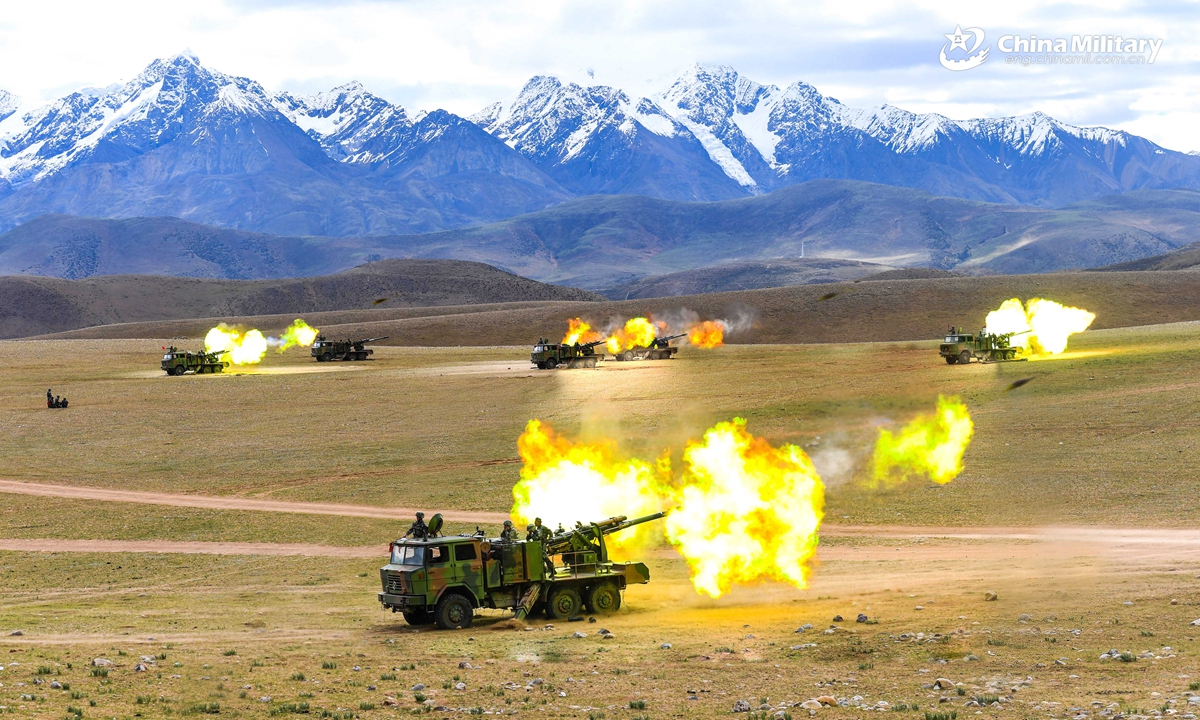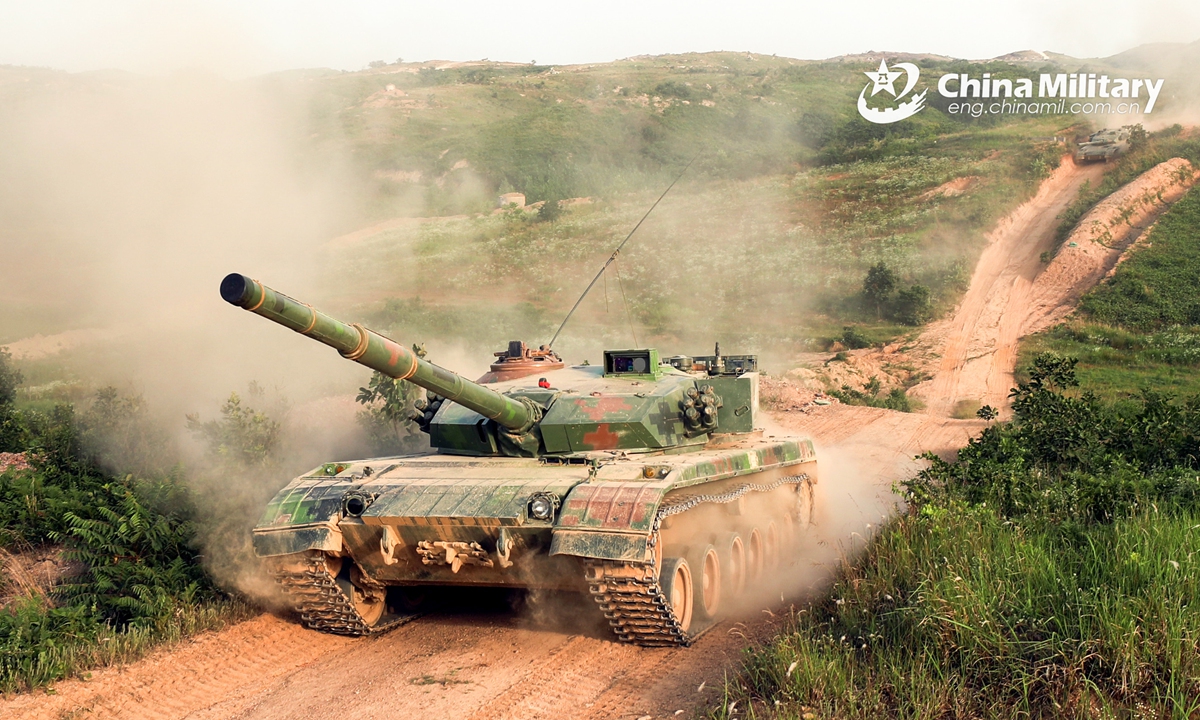- Joined
- Jul 25, 2018
- Messages
- 4,593
- Points
- 113
https://www.globaltimes.cn/content/1192345.shtml
India knows ‘it can’t have a war with China’
By Yang Sheng and Liu Xuanzun Source:Global Times Published: 2020/6/21 21:48:40
222
New Delhi would be ‘more humiliated than 1962’ if it launches a new conflict

Truck howitzers attached to a brigade under the PLA Xizang Military Command fire a salvo of shells at mock targets during a coordinated exercise recently.Photo:China Military
After the border clash in the Galwan Valley, nationalism and hostility against China within India are rising sharply, while Chinese analysts and some reasonable voices inside India warned that New Delhi should cool down the nationalism at home.
India will be more humiliated than after the 1962 border conflict with China if it cannot control anti-China sentiment at home and has a new military conflict with its biggest neighbor, analysts said on Sunday.
Indian Prime Minister Narendra Modi said Friday that his government has given the armed forces full freedom to take any necessary action, and he also appeared to downplay the clash that killed 20 Indian soldiers and injured more than 70 on the Chinese side of the Line of Actual Control in the Galwan Valley on Monday.
"Nobody has intruded into our border, neither is anybody there now, nor have our posts been captured," Modi said, referring to Ladakh's Galwan Valley, Reuters reported.
Chinese observers said Modi is trying to respond to the nationalists and hardliners with tough talk, but he understands his country cannot have further conflict with China so he is also making an effort to cool tensions.
Lin Minwang, a professor at Fudan University's Center for South Asian Studies in Shanghai, told the Global Times on Sunday that Modi's remarks will be very helpful to ease the tensions, because as the prime minister of India, he has removed the moral basis for hardliners to further accuse China.
However, if conflict breaks out, China's overwhelming advantages on transportation and military industry will help the People's Liberation Army to acquire an absolute strategic and tactical advantage against the India on the frontline.
"This is why India hasn't dared to launch a full attack against the PLA in decades but keeps creating low-level tensions occasionally," he noted.
Indian forces use weapons bought from different countries which many not coordinate with each other well, not to mention their undisciplined troops who can blow up their own submarine in a dockyard and shoot down a friendly helicopter, observers noted.
Rational voices within India are also calling Modi not to repeat former Indian prime minister Jawaharlal Nehru's mistakes on the China front.
Indian economist Swaminathan Aiyar said in a Saturday report by Indian media outlet the Economic Times that the gap between China and India militarily and economically is five times bigger than it was in 1962. Attempting military adventures in that area is asking to be thrashed again and humiliated on a scale five times bigger than in 1962.
In a potential self-defense counterattack, China will secure its own territory and not likely claim Indian territory after emerging victorious, but the battle will deeply hurt India so much that global position and economy would go backwards to decades ago, Chinese analysts said.
India knows ‘it can’t have a war with China’
By Yang Sheng and Liu Xuanzun Source:Global Times Published: 2020/6/21 21:48:40
222
New Delhi would be ‘more humiliated than 1962’ if it launches a new conflict

Truck howitzers attached to a brigade under the PLA Xizang Military Command fire a salvo of shells at mock targets during a coordinated exercise recently.Photo:China Military
After the border clash in the Galwan Valley, nationalism and hostility against China within India are rising sharply, while Chinese analysts and some reasonable voices inside India warned that New Delhi should cool down the nationalism at home.
India will be more humiliated than after the 1962 border conflict with China if it cannot control anti-China sentiment at home and has a new military conflict with its biggest neighbor, analysts said on Sunday.
Indian Prime Minister Narendra Modi said Friday that his government has given the armed forces full freedom to take any necessary action, and he also appeared to downplay the clash that killed 20 Indian soldiers and injured more than 70 on the Chinese side of the Line of Actual Control in the Galwan Valley on Monday.
"Nobody has intruded into our border, neither is anybody there now, nor have our posts been captured," Modi said, referring to Ladakh's Galwan Valley, Reuters reported.
Chinese observers said Modi is trying to respond to the nationalists and hardliners with tough talk, but he understands his country cannot have further conflict with China so he is also making an effort to cool tensions.
Lin Minwang, a professor at Fudan University's Center for South Asian Studies in Shanghai, told the Global Times on Sunday that Modi's remarks will be very helpful to ease the tensions, because as the prime minister of India, he has removed the moral basis for hardliners to further accuse China.
However, if conflict breaks out, China's overwhelming advantages on transportation and military industry will help the People's Liberation Army to acquire an absolute strategic and tactical advantage against the India on the frontline.
"This is why India hasn't dared to launch a full attack against the PLA in decades but keeps creating low-level tensions occasionally," he noted.
Indian forces use weapons bought from different countries which many not coordinate with each other well, not to mention their undisciplined troops who can blow up their own submarine in a dockyard and shoot down a friendly helicopter, observers noted.
Rational voices within India are also calling Modi not to repeat former Indian prime minister Jawaharlal Nehru's mistakes on the China front.
Indian economist Swaminathan Aiyar said in a Saturday report by Indian media outlet the Economic Times that the gap between China and India militarily and economically is five times bigger than it was in 1962. Attempting military adventures in that area is asking to be thrashed again and humiliated on a scale five times bigger than in 1962.
In a potential self-defense counterattack, China will secure its own territory and not likely claim Indian territory after emerging victorious, but the battle will deeply hurt India so much that global position and economy would go backwards to decades ago, Chinese analysts said.



